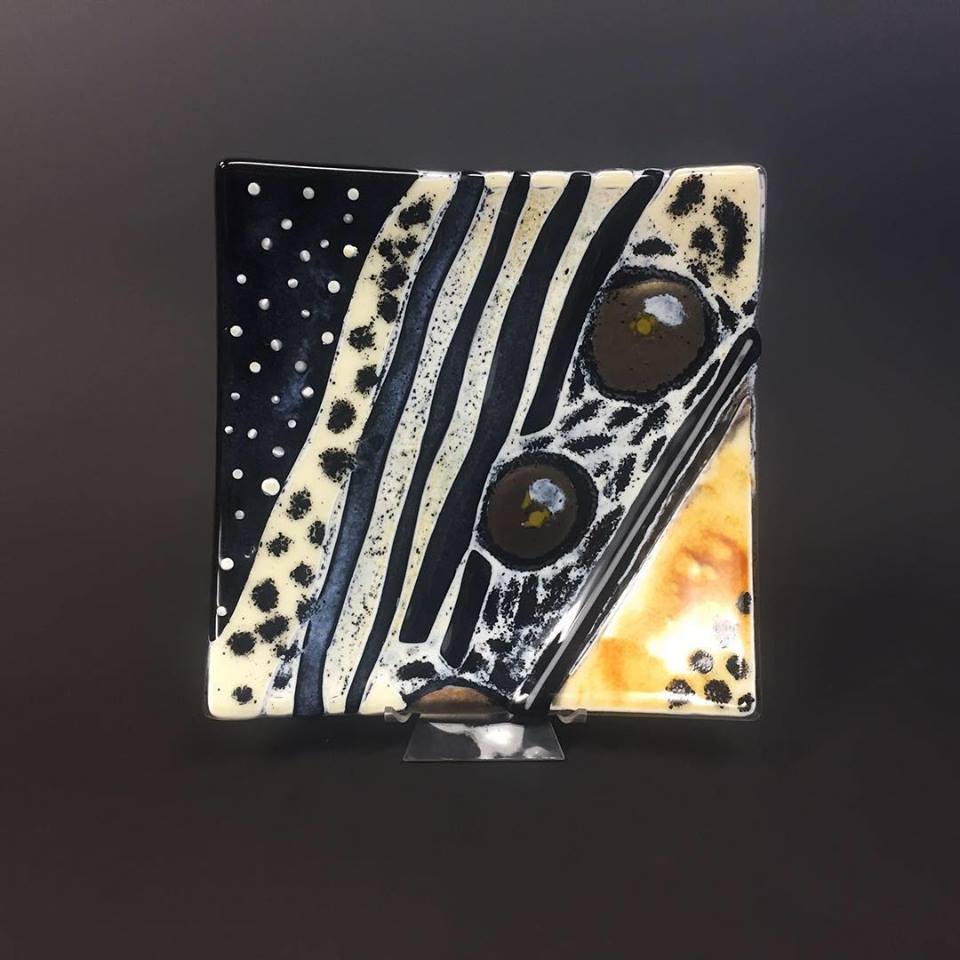

"Many species-- most commonly birds, insects, and amphibians-- display patterning that indicates something about the animal. Further complicating the subject, some species engage in specialized mimicry. A non-poisonous species will have patterning that resembles a poisonous species, making it distasteful to predators. These patterns, and this type of masking, makes me consider the way humans engage in masking and indicate our own qualities to others without language. This work, Mixed Signals, addresses one of my most pervasive struggles as a survivor of sexual assault-- my need for intimacy and my simultaneous aversion to it. The patterns featured express an entire spectrum of need for touch, from “come closer” to “stay far away.” Large fused glass panes of these indicative patterns have been slumped into the feminine form to create the fractured exoskeleton of a woman. The shell that implies the body displays mixed signals-- from poison and ability to sting to ornamentation and desire to attract."
Featured species include: the rainbow poison dart frog, great argus pheasant, pipevine swallowtail butterfly, Vogelkop's superb bird-of-paradise, the Indian owlet moth, the painted bunting, the greater blue ringed octopus, and the peacock jumping spider
Photo by Betty Gowans; Modeling by Emily Bartelt Juel; Metal Fabrication by Johnny Shield


Painted Bunting

Indian Owlet Moth

































"Many species-- most commonly birds, insects, and amphibians-- display patterning that indicates something about the animal. Further complicating the subject, some species engage in specialized mimicry. A non-poisonous species will have patterning that resembles a poisonous species, making it distasteful to predators. These patterns, and this type of masking, makes me consider the way humans engage in masking and indicate our own qualities to others without language. This work, Mixed Signals, addresses one of my most pervasive struggles as a survivor of sexual assault-- my need for intimacy and my simultaneous aversion to it. The patterns featured express an entire spectrum of need for touch, from “come closer” to “stay far away.” Large fused glass panes of these indicative patterns have been slumped into the feminine form to create the fractured exoskeleton of a woman. The shell that implies the body displays mixed signals-- from poison and ability to sting to ornamentation and desire to attract."
Featured species include: the rainbow poison dart frog, great argus pheasant, pipevine swallowtail butterfly, Vogelkop's superb bird-of-paradise, the Indian owlet moth, the painted bunting, the greater blue ringed octopus, and the peacock jumping spider
Photo by Betty Gowans; Modeling by Emily Bartelt Juel; Metal Fabrication by Johnny Shield
Painted Bunting
Indian Owlet Moth
